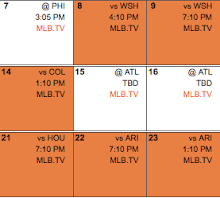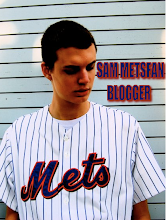
Sandy Alderson and the New York Mets interviewed Terry Collins for the second time on Thursday as the club forges ahead in looking for Jerry Manuel's successor.
While I find it a little unnerving that all four of the final candidates called back for the final round of interviews are in-house candidates, I just don't feel comfortable with Collins.
It's as intangible as anything else, but I just don't believe he has the makeup needed to guide the Mets back to relevance.
Yes, he has six years of Major League experience under his belt, but how much does that really count for?
Considering he hasn't managed in the bigs in more than a decade, does his experience really make him any more suitable than Chip Hale of Wally Backman?
I don't think Backman is right for the job either, but I would consider Collins' change on a par with Backman's. Hale, despite no Major League experience, has a more hands-on knowledge of the challenges facing the current roster and I think that a degree of continuity is important.
With that in mind, I think Hale's familiarity with the Major League club holds more weight than the work Collins has done in the past year as Minor League field coordinator.
Even if you do consider that Collins' experience with the Houston Astos and the California Angels is invaluable, look at his tenure with these teams where he spent three years each.
Collins managed the Astros to a 224-197 record in three seasons between 1993 and 1996. Despite having the highest winning percentage of any manager at the time, he was fired under a veil of needing to "change dynamics" at the club.
Rumors had it that he was an unpopular manager, and the fact that he was replaced by the team's broadcaster Larry Dierker—a man with no managerial experience but described as "fan friendly" by the Fort Lauderdale Sun Sentinel—must tell you something.
Apparently the organization had so little faith in Collins' ability to lead the team in the right direction that they kicked him to the curb in favor of a play-by-play guy.
Collins stayed in the business by landing a job with the Angels, but his fierce regime had some people thinking that it led to a number of late-season collapses.
Then towards the end of the 1999 season, players' complaints began criticizing his passive managerial style. Others were apparently unhappy at his inability to manage a diverse group of players in the clubhouse.
Team leader Mo Vaughn, Randy Velarde and Todd Greene were so upset with Collins that they met with then-Angel General Manager Bill Bavasi to urge him not to offer Collins an extension.
Bavasi tried to save face by backing up his manager, although when it came down to putting his money where his mouth was, he never tried to talk Collins out of his resignation near the end of the 1999 season.
It's sad, because there are things that would fit almost perfectly with Alderson's ideals. There's just not the right ones.
At his introduction to the press at Citi Field, Alderson said he continues to believe that on-base percentage and slugging and power and so forth are important. He is known for his fondness for sabermetric analytical tools, much like Collins who shares his affinity for things like OBP.
Alderson also wants someone who is fiery and who isn't afraid to stand up to umpires. Again, if Collins' reputation precedes him, he seems a good fit.
Unfortunately, Alderson also said leadership is key, and that is where I think Collins is lacking. When it comes down to managing a big market team under the scrutiny of New York's media, leadership trumps a potential manager's analytical skills or intuition.



 But Oberkfell and Oquendo may not remain candidates for long. Multiple reports on Friday indicated that the Mets have already decided to meet again with Clint Hurdle, Bob Melvin and Terry Collins, each of whom could interview for a second time as soon as next week. Chip Hale may also earn a call-back interview, according to the reports, though he is the only one of the group without Major League managing experience.
But Oberkfell and Oquendo may not remain candidates for long. Multiple reports on Friday indicated that the Mets have already decided to meet again with Clint Hurdle, Bob Melvin and Terry Collins, each of whom could interview for a second time as soon as next week. Chip Hale may also earn a call-back interview, according to the reports, though he is the only one of the group without Major League managing experience.
 From what I understand, Collins is very well respected in the Mets minor league system, and his familiarity with the minor leagues could be an asset for him as manager of the big league club. I think it certainly eliminates a major learning curve since he is already a part of the organization. It doesn’t mean he is the right guy for the job, nor does that mean he will be good at the Major League level. But that familiarity, plus the experience Collins has, albeit not recent, speaks to what Alderson and his group are looking for in the next manager.
From what I understand, Collins is very well respected in the Mets minor league system, and his familiarity with the minor leagues could be an asset for him as manager of the big league club. I think it certainly eliminates a major learning curve since he is already a part of the organization. It doesn’t mean he is the right guy for the job, nor does that mean he will be good at the Major League level. But that familiarity, plus the experience Collins has, albeit not recent, speaks to what Alderson and his group are looking for in the next manager.






